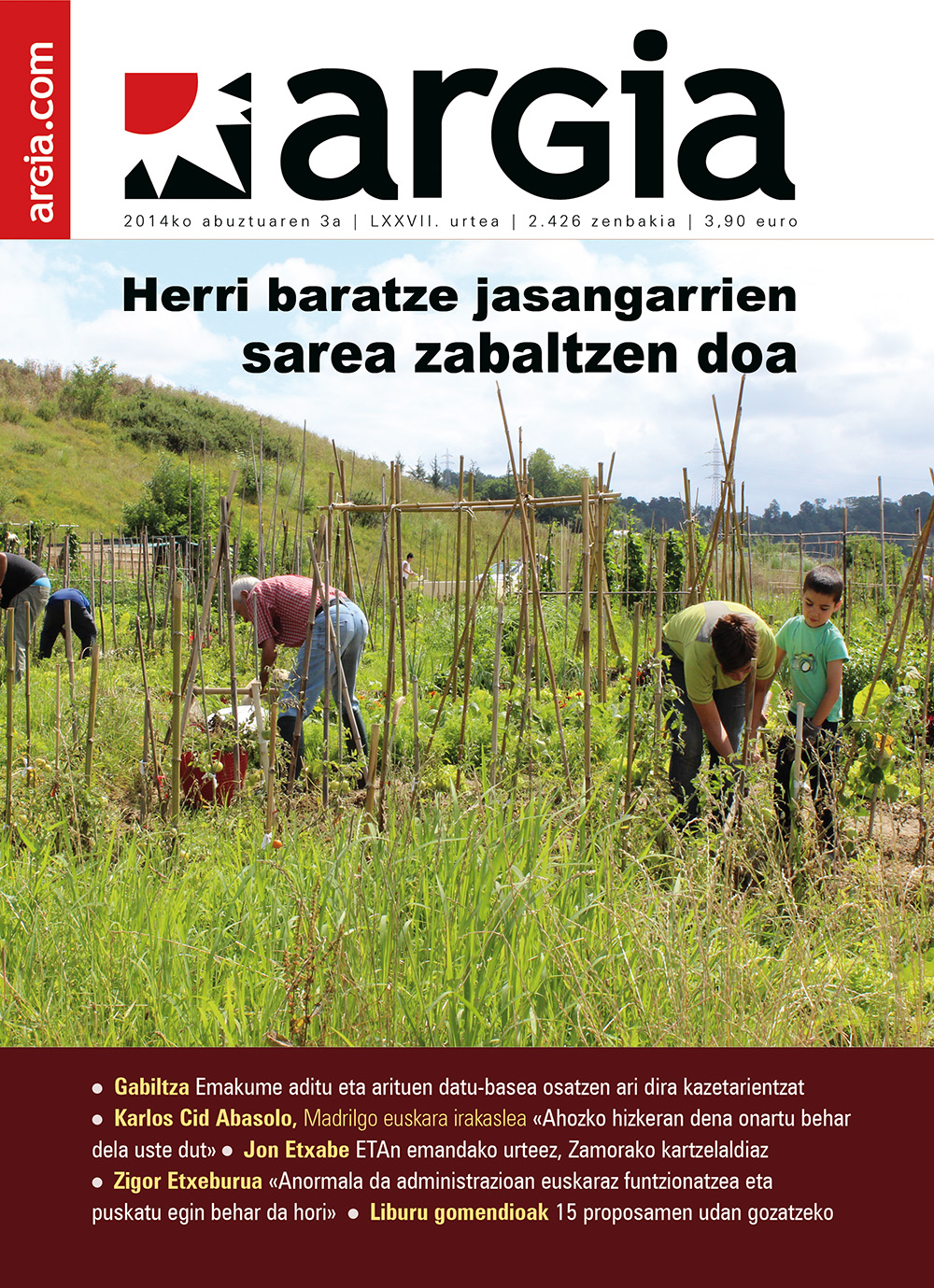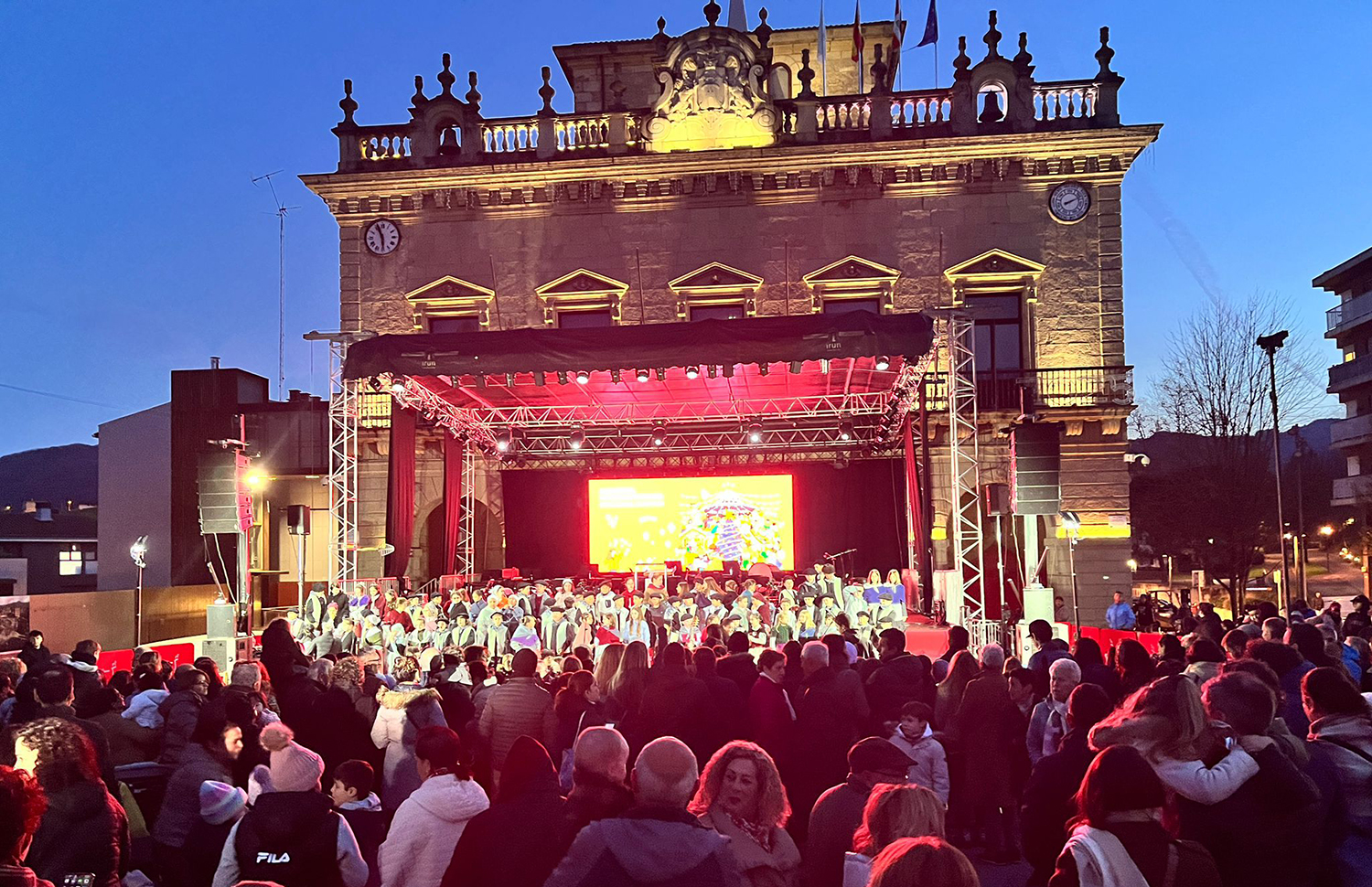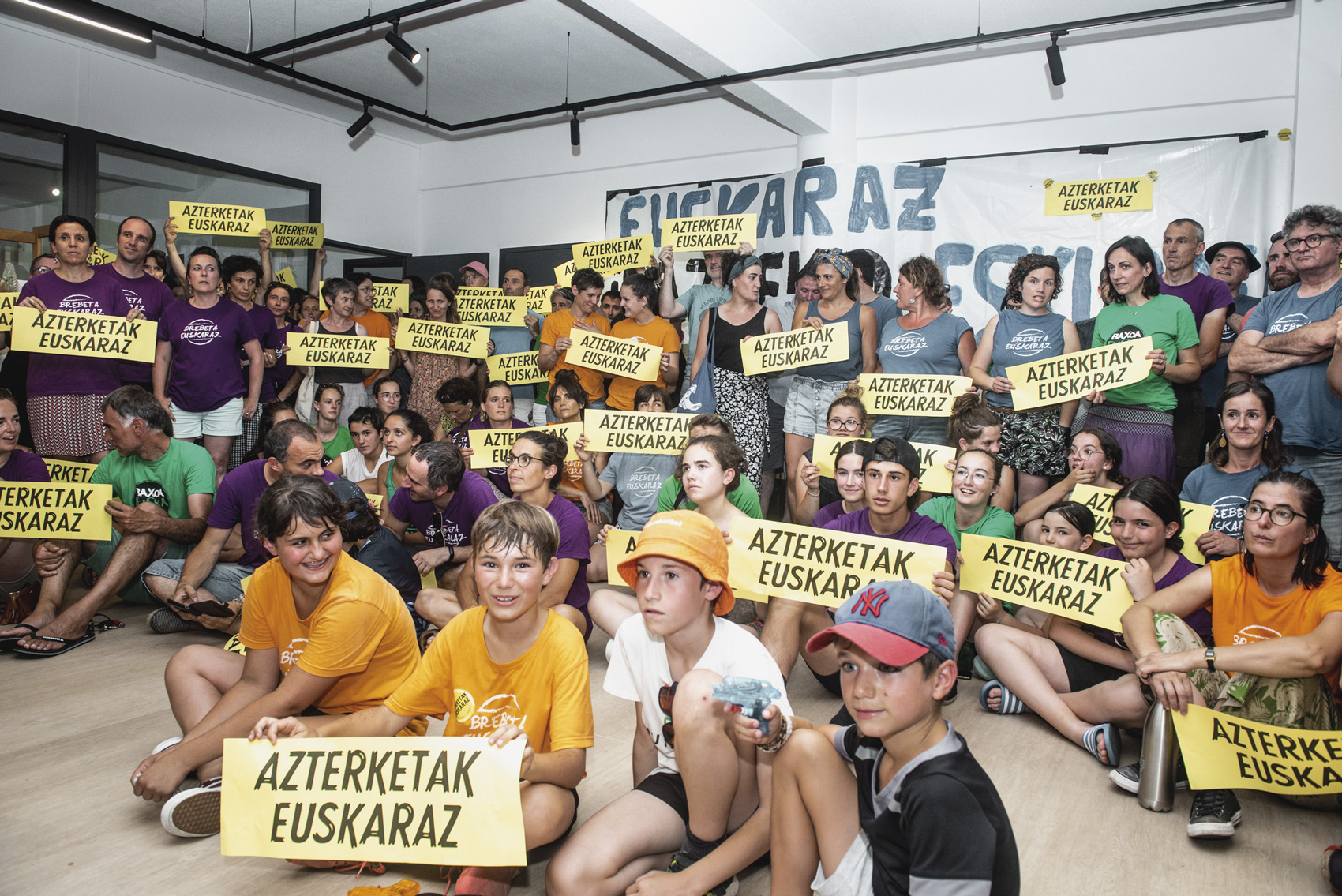"It is in the subconscious of citizenship that the administration does not work in Basque"
- Zigor Etxeburua (Donostia-San Sebastián, 1970) began the legislature in 2011 with a challenge: In 2015, the Provincial Council would offer all services in Basque. He knows that will not be the case. In any case, it does not intend to be disappointed, it is clear that the administration must be an example for the citizens in the normalization of the Basque Country.

One of the most important initiatives of the legislature has been the introduction of linguistic criteria in public contracts, both in the Parliament and in many municipalities. Why is it so important?
Institutions, because they make companies do what they have to do. In this legislature, since we entered, we have said that there are laws that regulate the use of Euskera, but that they are not applied many times. The way forward has been to implement the legislation. In addition, we have improved the tools we had so far in the Parliament itself.
What tools?
We have substantially improved the 2009 regulation. In addition, not all municipalities established linguistic criteria, and thanks to this dynamic we have united, promoted a project of collaboration and attracted what was not being done.
It says that the application of the criteria is of intrinsic and external importance.
From the outside, a clear message is sent to society: the intention to normalize the Basque country is real, we do not shrink with the practical obstacles, and we take it to the head. We don't stop at words. Society has understood that the issue has been dealt with seriously once and for all.
On the one hand, it says that they are complying with the regulations, and on the other, the Spanish State is putting the point of view. You seem to be breaking the law.
This issue leads to the Euskaldunization of the socio-economic sphere. Society normalizes what it lives every day. It is not heteronous, it reaches the daily realms of life. In short, it forces companies to offer their services in Euskera, which has great implications. Companies need vasco-speaking workers, an Euskaldun corporate image, that is, the development of the Basque country comes to the last end.
The Spanish State has been very aware of the possibilities offered by this subject. It is said that there is political consensus, but the implementation of the normalization of the Basque Country is delayed; it is always for later. There is an apparent complacency, but when it comes to practice it gets stuck.
If there is a legal framework and all you do is apply it, what has the state grabbed to contradict itself?
I come back to the beginning. So far it has not been implemented, so it has not given rise to any problems. The Basque Government also said that the rule had been in force since 2006, but it never applied it, so it has given no problem. The Deputy has been in office since 2009. Language criteria were established in 40% of contracts in 2010, currently in 93% of contracts. There is now a clash of regulations due to their implementation. What is the clash of regulations? If you like, there is a problem that we too have highlighted: to what extent the Basque Government is real.
Who's in the collision?
The State says that it has exclusive competence in the field of recruitment and what we have here is the Basque official. It is also clear that there is political force. Although they have exclusive competence in hiring, they should combine it with the Basque Government. In short, the Basque language is one of the official languages of “Spain”.
They have called for the support of the Basque Government.
After many requests, he convened the meeting of HAKOBA. He was asked to respond to the needs of the municipalities, that somehow the defense be made before the state. The Council of Ministers of the Basque Country on 8 April last called for the implementation of the legal report, and we have not received any news yet.
UEMA and the Foral Council separately requested a new meeting. We will again call for the establishment of the working party and advice to the municipalities. The meeting of HAKOBA will be on 30 July. The Government is absolutely standing still.
It gave its verbal support to the Council and the municipalities.
Yes, but in practice it is not carried out at all. Moreover, the State began to denounce the linguistic criteria for contracts and subsequently denounced the linguistic criteria for subsidies. Another line that has begun is to demand the bilingual sending of the information to the municipalities that send it in full in Basque.
It has three open fronts.
Yes, three, and the government knows that.
You have been asked for legal advice.
There is a legal group in the Basque Advisory Council, but one of its members told me that, in addition to their work, the Government’s legal teams should prepare and implement their legal reports.
The government, to put it in some way, has allowed everyone to organise their defence and does not seem to us to be a problem for some municipalities. The Law of the Vascuence is a barrier derived from the application of the law. In addition, we have not gone beyond the Basque Law. Does the City of Tolosa or the City of Beizama have to defend the Basque Government before the courts? Or is it up to the institution that has that responsibility? The competence for standardisation lies with the Basque Government.
How have companies responded to the fulfilment of the procurement criteria?
There has been no negative concern, on the contrary, all the messages we are receiving are positive. Many companies have come to the consulting companies of Euskera to learn about their Euskera plans, as well as to the Euskaltegis to gather information. Objective data are available: In the last two years the Bikain certificates in Gipuzkoa have doubled; in 2013, the Bai Euskarari certificate has added 40 new agents in Gipuzkoa. That same year, 500 new students enrolled in the Basque Country in Gipuzkoa. The conclusion is more indirect, as the grants to learn Euskera increased, but we know that despite the fact that in Bizkaia and Álava there is a scholarship from the Basque Government the students of Euskera have been lost.
They have asked the public if they want a relationship in Basque with the Deputy. With finance, for example. What has been the result?
From a technical point of view, it has been the biggest frustration of the legislature. It is clear to us that we must respect the linguistic choice of citizenship and to that end we must know the choice of citizenship. We had to look for ways to do that. In the 2012 income campaign, citizens were asked about the linguistic option. What happened to us? That Hacienda asked, and that the other departments cannot use that information, unless the citizens give us their express consent. We had to ask a second question, to see if it allowed us to transfer that data to the other departments. That totally lost the way.
Why?
Hacienda some 50,000 people told him they just wanted to relate to Basque, but the second question they didn't answer in the same way, people shrunk. We are working to be able to correct, but it will not come immediately. Technically, it's complicated. The Member himself should consult all citizens and check the information obtained with all departments.
For the time being, therefore, you have the citizens’ response to the Department of Finance.
It has gone very well. The number of people who want a relationship exclusively in Basque has doubled [50,000]. In any case, the declaration of income is made by more than 400,000 citizens of the Basque Country. We are still a long way away.
You say that the attitude of the administration must be an example.
Otherwise, we send contradictory messages. This year the socio-linguistic survey and the socio-linguistic map have been published and the Basque autonomous community is said to be increasingly Euskaldun. It is also said that use does not go to the same extent and the citizen is accused of not using it. When the administration is not being used at the same pace as society is being used to unify. The administration is obliged to use Euskera and does not. Therefore, in the subconscious of citizenship is that the administration does not work in Basque, that society does not work in Basque. It is normal for it to work in Euskera. That has to be broken. The Administration must be an example, firstly because that is what it is entitled to do by law, and also because it is one of the most important social benchmarks. It is a shooter, it is a tractor, it brings companies, individuals, institutions behind it... it has great implications in the euskaldunization of the administration.
They said that by the end of the legislature you would offer all the services in Basque. How far have you come?
We have, among other things, applied the regulation, and I repeat, it is polite, but it must be applied. The list of jobs for the public has been drawn up and the level of primary and secondary reception has been determined. Because on many occasions this issue has been limited to the counter or to the workers who are in the access to the institutions. Citizens take the service on all floors. We must generalize the approach, that all personnel related to citizenship be Euskaldun.
In addition to mapping public jobs, people have been mobilised from jobs, disabled staff cannot be exposed to the public. And if it has been possible to move, it has not always been possible, sometimes it has been replaced. At the same time, specialized training has been carried out. We have not left the worker alone. For example, in the Segura hostel, a specialized training session has been organized with cooks and kitchen staff, not to euskaldunize, but so that the young people who travel there can speak in Euskera in this particular activity.
And then there's the new staff area. At present, public calls cannot be made, but workers can be welcomed. We workers must ensure that they are Euskaldunes and we are doing so systematically. Linguistic profiles have been established. It obviously has positive aspects for citizenship, but it also has negative aspects. The one who is not trained and has been on the job market has now been left out. For the 2012 income campaign, the group of 80 people was forced to have the EGA or the Third Language Profile. The group of workers who until then worked in this work denounced it in the courts. The courts have given us reason.
A containment wall should be installed, not being able to include those who lack the linguistic ability for their work. You cannot leave it for later on, if after starting to work you get the Basque level.
What needs to be done?
Three-quarters of the staff have a linguistic profile for their job. Others are exempt or the post is not covered. In this sense we are in a very good position, but there are sections that have difficulties: there are staff in groups that are increasing in age, so there are more Castilian speaking apartments than others. You will have to wait for your retirement.
The most difficult will be the Department of Social Policy. Outside companies offer services, e.g. nursing homes. There are many workers. From one day to the next we cannot Euskaldunizar. We have established linguistic criteria in recruitment, but the change is not going to happen overnight. For its part, the Provincial Council has undertaken to take over the day centres run by municipalities. At the time the centre embraces it, it must also take care of the workers.
I can therefore anticipate that under no circumstances will we achieve the stated objective. We are aware that the deadline we were taking was too narrow, but we thought it necessary to set a deadline for us to be bound by it. The pace must not be marked by the comfort or the will of each, but by the objective that is owed to the citizen. The normalization of Euskera in the administration cannot go by the will, in that we are very critical of the government.
You have an agreement with UEMA. They say that the centres of inspiration in Euskera should be given preferential treatment in the linguistic policy of the beginning of the twenty-first century. Why do they need preferential treatment? Is something worrying happening?
Yes. 5. Sociolinguistic Maps and V. The Sociolinguistic Survey has shown that the centers that breathe in Euskera are changing. It is worrying. It was the first public legislature pact we made with UEMA and the Council, with the intention of working, caring and protecting in the respiratory zone. The Respiratory Centers are the support of the Basque Country, in these municipalities the Basque Country is healthier. They're an example. It is therefore essential that they maintain their characteristics. Our first intention, also in that, has been to establish a containment wall, which is not damaged, to monitor, not to cause setbacks in the present situation. What is more, to improve, to expand and to strengthen.
What sack of money would the Council need for the normalization of the Basque Country, in order to reach wherever it may reach?
I answer the question, but let me say something earlier. I say this to myself and to my fellow Members, this is not an issue that I am raising in the air: we have to order once and for all the issues that exist in the budgets of the Basque Country. Today, still, in the administrations in general, we have too many cultural things in the budgets for the normalization of the Basque country. We cannot continue to take into account in our budgets the promotion of literature, the fondness for bertsolarism… and others (and I am not against anyone). Of course, they have a lot to do with the normalization of Euskera, but culture is culture. If we released from our budget a number of things that should be in the culture, we would have another nice piece.
It is true that we are claiming that 2% should be given to the Basque people. I do not know if it has to be 2%. First we ordered it and then we agreed if it should be %1, 1,5 or 2. Today we are at 0.8. I am clear that we need more money and I have asked our government to make that effort.
How much more is it?
Another million would be included in our budget. Needless to say, two million, but being realistic, I believe that our budget needs another million. Similarly, what has been said about culture, at least EUR half a million is not where it should be.
























